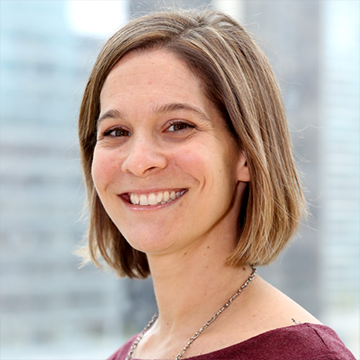Kids, Mental Health and COVID-19 with Tali Raviv, PhD
Caregivers reported that students experienced significantly worse psychological well-being after COVID-19-related school closures as compared to before, according to findings published in JAMA Network Open. Tali Raviv, PhD, associate professor of Psychiatry and Behavioral Sciences at Feinberg, explains the results and offers insight.

"Kids are incredibly resilient. They have the capacity to grow and learn and change and flourish under really challenging conditions, probably better than adults do. I think the key (to supporting children) is making sure that we're taking care of mental health and well-being of the adults that are surrounding them."
- Associate Professor of Psychiatry and Behavioral Sciences in the Division of Child and Adolescent Psychiatry
- Associate Professor in the Weinberg College of Arts and Sciences
- Clinical Psychologist at Ann & Robert H. Lurie Children’s Hospital of Chicago
- Associate Director of the Center for Childhood Resilience at Ann & Robert H. Lurie Children’s Hospital of Chicago
Episode Notes
In this episode, PhD, explains the results of a survey of over 32,000 caregivers of youth in Chicago Public Schools (CPS) about
Topics covered:
- Much of Raviv's work focuses on promoting resilience and increasing access to evidence-based mental health programming for children. She says 70 percent of kids who receive mental health services access services at their schools. When remote learning began, her first thought was: "Who is going to notice what's going on with these students?"
- She describes the disruption of remote learning as well as the exposure to additional stressors and traumas faced by many families, such as loss of income, lack of access to healthcare and mental healthcare, and the experience of losing family members or being with family members who were ill.
- To understand caregiver attitudes toward returning to in-person schooling, CPS designed a survey and distributed it to 350,000 families from June 24 to July 15, 2020. On behalf of nearly 50,000 children in pre-kindergarten through 12th grade, 32,217 caregivers completed the survey.
- According to Raviv, while COVID-19 related stressors were experienced by nearly all families in the survey, Black and Latinx participants experienced significantly more of these stressors.
- Around a quarter of children and adolescents were described as stressed, anxious, angry or agitated after pandemic-related school closures and the switch to remote learning. Around a third of youth were described by caregivers as lonely and only one-third were described as having positive social and peer relationships.
- She hopes the survey results are taken seriously by pediatricians, parents, teachers and policymakers. "We have to really think about the impact on the mental health and well-being of a whole generation of youth, we have to look at what kinds of programs we are putting in place," Raviv says. "What kind of funding do we have for schools, for example, to respond to the increased need?"
Additional Reading and Resources:
- Young adults have been hit hardest with depression during the pandemic (The Covid States Project #54: Mental Health in the U.S.)
Subscribe to Feinberg School of Medicine podcasts here:
iTunes
Spotify
Google Play Music
Recorded on May 26, 2021.
Continuing Medical Education Credit
Physicians who listen to this podcast may claim continuing medical education credit after listening to an episode of this program.
Target Audience
Academic/Research, Multiple specialties
Learning Objectives
At the conclusion of this activity, participants will be able to:
- Identify the research interests and initiatives of Feinberg faculty.
- Discuss new updates in clinical and translational research.
Accreditation Statement
The Northwestern University Feinberg School of Medicine is accredited by the Accreditation Council for Continuing Medical Education (ACCME) to provide continuing medical education for physicians.
Credit Designation Statement
The Northwestern University Feinberg School of Medicine designates this Enduring Material for a maximum of 0.25 AMA PRA Category 1 Credit(s)™. Physicians should claim only the credit commensurate with the extent of their participation in the activity.
Disclosure Statement
Tali Raviv, PhD, has nothing to disclose has nothing to disclose. Course director, Robert Rosa, MD, has nothing to disclose. Planning committee member, Erin Spain, has nothing to disclose. Feinberg School of Medicine's CME Leadership and Staff have nothing to disclose: Clara J. Schroedl, MD, Medical Director of CME, Sheryl Corey, Manager of CME, Allison McCollum, Senior Program Coordinator, Katie Daley, Senior Program Coordinator, and Rhea Alexis Banks, Administrative Assistant 2.